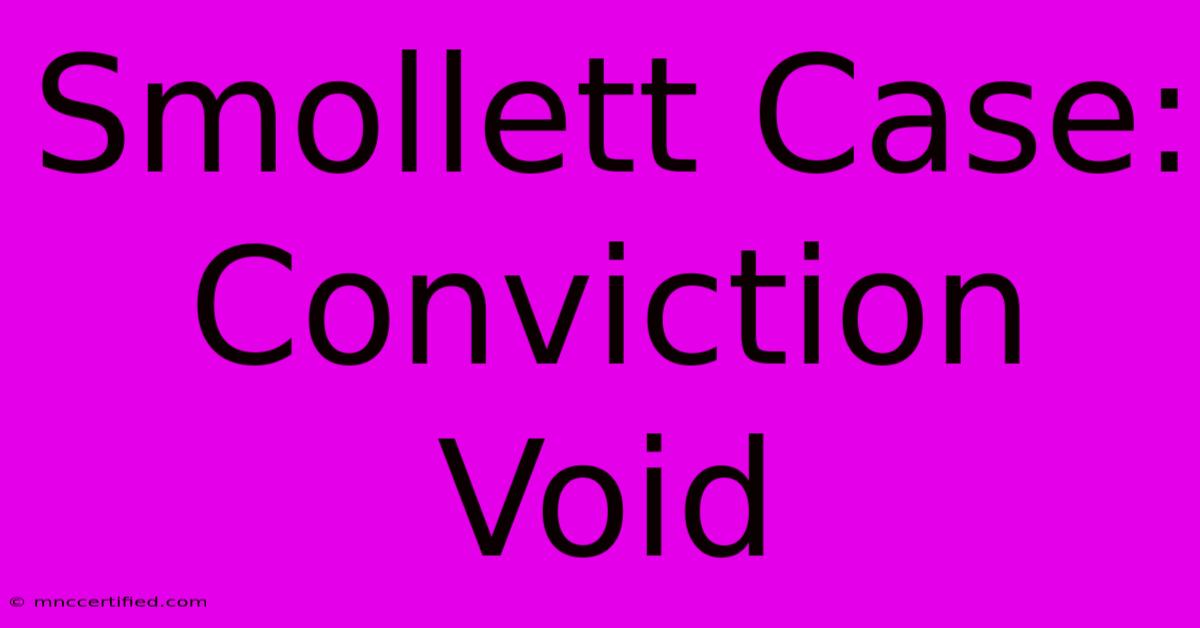Smollett Case: Conviction Void

Table of Contents
Smollett Case: Conviction Voided – A Deep Dive into the Controversial Case
The Jussie Smollett case remains one of the most controversial and talked-about legal battles of recent years. This article will delve into the details of the case, focusing specifically on the voiding of his conviction and the subsequent legal and public ramifications. Understanding this case requires examining the initial allegations, the trial, the controversial verdict, and the aftermath.
The Initial Allegations and the Subsequent Investigation
In January 2019, Jussie Smollett, then a star on the television show Empire, reported to Chicago police that he had been the victim of a hate crime. He claimed he was attacked by two masked men who shouted racial and homophobic slurs, poured bleach on him, and placed a noose around his neck. The incident immediately sparked outrage and widespread media coverage, fueling national conversations about race, hate crimes, and the safety of LGBTQ+ individuals.
However, the Chicago Police Department's investigation revealed inconsistencies in Smollett's account. This led to a dramatic shift in the narrative. The investigation eventually concluded that Smollett had staged the attack himself, paying two brothers to participate in the hoax.
The Trial, Verdict, and Public Reaction
Smollett was subsequently charged with disorderly conduct, a felony. The trial generated significant media attention, with many questioning Smollett's motives and the impact of his actions on the fight against actual hate crimes. The prosecution presented evidence suggesting Smollett orchestrated the event to gain sympathy and advance his career.
The jury found Smollett guilty on five of the six counts of disorderly conduct. The verdict was met with a mixture of reactions. Some celebrated it as justice served, highlighting the importance of accountability for false reporting of hate crimes. Others criticized the severity of the charges and the perceived disproportionate attention given to the case compared to other instances of false reporting.
The Conviction is Voided: A Controversial Decision
In a surprising turn of events, a judge later overturned Smollett's conviction. This decision fueled further debate and raised questions about the legal process. The judge's rationale centered on concerns about the fairness and impartiality of the proceedings. Specifically, the judge questioned the qualifications of the special prosecutor assigned to the case and claimed there were issues with the makeup of the jury. This reversal is a significant legal development, and has raised concerns about the potential for future challenges to similar convictions.
Arguments for and Against the Voided Conviction
The decision to void the conviction has sparked a significant debate. Supporters argue the judge acted to ensure justice and uphold proper legal procedure. They highlight the importance of ensuring fair trials and impartial judicial oversight.
Conversely, critics argue the decision undermines the integrity of the justice system and sends a message that individuals can escape accountability for their actions, particularly when their actions undermine the seriousness of actual hate crimes.
The Long-Term Implications
The Smollett case has profound long-term implications. It raises important questions about:
- The reporting of hate crimes: The case highlighted the importance of thorough investigations to distinguish between genuine hate crimes and false reports.
- The impact of media coverage on public perception: The extensive media attention surrounding the case influenced public opinion and contributed to the polarization surrounding the verdict.
- The integrity of the justice system: The overturning of the conviction raises concerns about the potential for manipulation and the importance of unbiased judicial processes.
- The consequences of false reporting: The case serves as a reminder of the serious consequences, both legal and social, of filing false reports, especially those involving hate crimes.
The Smollett case is far from over in terms of public discussion and analysis. Its impact will likely continue to be felt for years to come, shaping conversations about race, hate crimes, and the complexities of the legal system. The voiding of his conviction remains a particularly contentious aspect, prompting ongoing debate and scrutiny.

Thank you for visiting our website wich cover about Smollett Case: Conviction Void. We hope the information provided has been useful to you. Feel free to contact us if you have any questions or need further assistance. See you next time and dont miss to bookmark.
Featured Posts
-
Remembering Ken Reid Taoiseachs Statement
Nov 22, 2024
-
Reverend Coles Partner A Tragic Loss
Nov 22, 2024
-
Multiple Accidents Car Insurance
Nov 22, 2024
-
Ground Beef Recall 160 000 Pounds
Nov 22, 2024
-
Womens Champions League Live Arsenal Juventus
Nov 22, 2024